There has been a dramatic rise in Ukraine's number of dead, according to new estimates by unnamed US officials. The BBC's Quentin Sommerville has been on the front line in the east, where the grim task of counting the dead has become a daily reality.
The unknown soldiers lie piled high in a small brick mortuary, not very far from the front line in Donetsk, where 26-year-old Margo says she speaks to the dead.
"It may sound weird… but I'm the one who wants to apologise for their deaths. I want to thank them somehow. It's as if they can hear, but they can't respond."
At her cluttered desk outside the mortuary's heavy door, she sits, pen in hand. It is her job to record the particulars of the fallen.
Ukraine gives no official toll of its war dead - the Ukrainian armed forces have reiterated that their war casualty numbers are a state secret - but Margo knows the losses are huge.
The figures remain classified. But US officials, quoted by the New York Times, recently put the number at 70,000 dead and as many as 120,000 injured. It is a staggering figure, from an armed forces estimated at only half a million strong. The UN has recorded 9,177 civilian deaths to date.
On Margo's inside right arm is a small tattoo of a mother and child, with the birthdate of her son recorded. Her manicured nails are painted in Ukrainian colours. She wears a black T-shirt with the words "I'M UKRAINIAN" on the front.
"The hardest is when you see a dead young guy who hasn't even reached 20, 22 years old. And realising they didn't die their own death," she says. "They were killed. They were killed for their own land. That's the most painful. You cannot get used to this. It's now getting to the point where it's just about [helping] the boys reach home."
The most difficult day of her life, she says, was when her common-law husband was brought into the mortuary on the day he died. Twenty-three-year-old Andrii was killed in battle on 29 December 2022.
"He died while defending his motherland," she says. "But then, for the umpteenth time, I've convinced myself that I should be here, I should be helping the fallen."
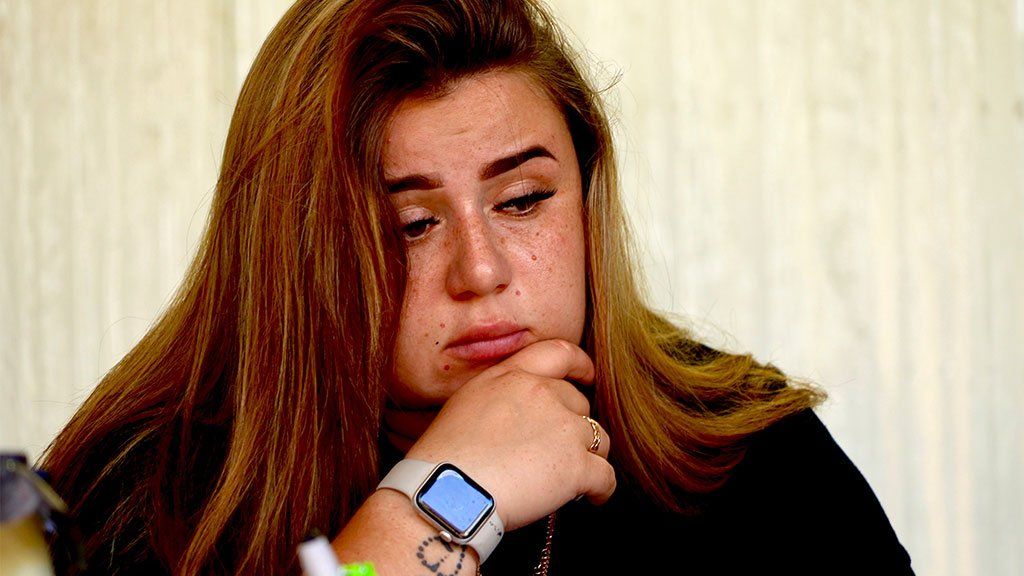
The job has made her hard - like steel, she says. And no matter how painful it is to see the bodies being brought into the mortuary, she says she never cries in public.
"I keep all of this inside me [until] the evening when I come home. No-one sees my tears."
As recently as April, leaked estimates from the Pentagon put Ukrainian deaths at the much lower figure of 17,500. The alleged jump to more than 70,000 can be partly explained by the counter-offensive in the south. In its early days it was especially hard on Ukrainian infantry - "worse than Bakhmut" one brigade commander who is fighting there told me. The city in Donetsk fell to Russia in May in one of the bloodiest battles of the war so far.
Ukraine has now changed tactics there, but the beginning of the push to breach Russia's occupation defences in June was costly, for young newly trained soldiers in particular. They were dying "by the dozens" every day, one senior sergeant fighting around the Donetsk village of Velyka Novosilka told me in June.
At the mortuary, one of a number along the front line, they work to put names to the unknown soldiers, who come direct from the battlefield.
Body bags are brought outside, one at a time, and the search for clues begins. Inside the first body bag is the corpse of a young man, his eyes still open, his hands folded carefully across his lap. His face is cut, and there is a gash on the side of his leg. Another body is brought out, the fingers missing on the right hand, blood and battlefield mud stain his uniform.
Their pockets are cut open by mortuary staff, still full of the artefacts of everyday life - keys, a mobile phone, a wallet with family snaps. In death, these items are now clues that might reunite the unidentified with their families.
Written in black marker pen on another body bag, the word "Unidentified" is scored out and replaced with a man's name and army company details.
More body bags emerge, but reporting restrictions don't allow me to say how many.
A group of soldiers - commanders of various ranks - arrive in an army pick-up truck and pace outside the mortuary, smoking cigarettes. They inspect one body, to see if the soldier is from their platoon, company or battalion. It looks like he was killed in an artillery strike - part of his head is missing and the wounds to his body are severe, even worse when he is turned over.
"This is difficult. Unpleasant. But it's needed, part of our job. We have to give the boys a proper send-off," says a deputy battalion commander who goes by the call sign "Avocat".
More men from his unit will be brought to aid in the identification of the body, he says.
The reality of the scale of casualties is laid bare in Ukraine's cemeteries.
In the late afternoon sun around Krasnopilske cemetery in Dnipro, the heads of the sunflowers hang heavy - an honour-guard for the freshly dug graves that spread ever closer to the perimeter.
At one such graveside, 31-year-old Oksana weeps alone. Pictures of her dead husband Pavlo gaze down on her. The bearded and brawny junior sergeant was a power-lifting champion and personal trainer. He was killed during Ukraine's previous counter-offensive, near the city of Izium in November when a missile from a Russian helicopter struck his convoy.
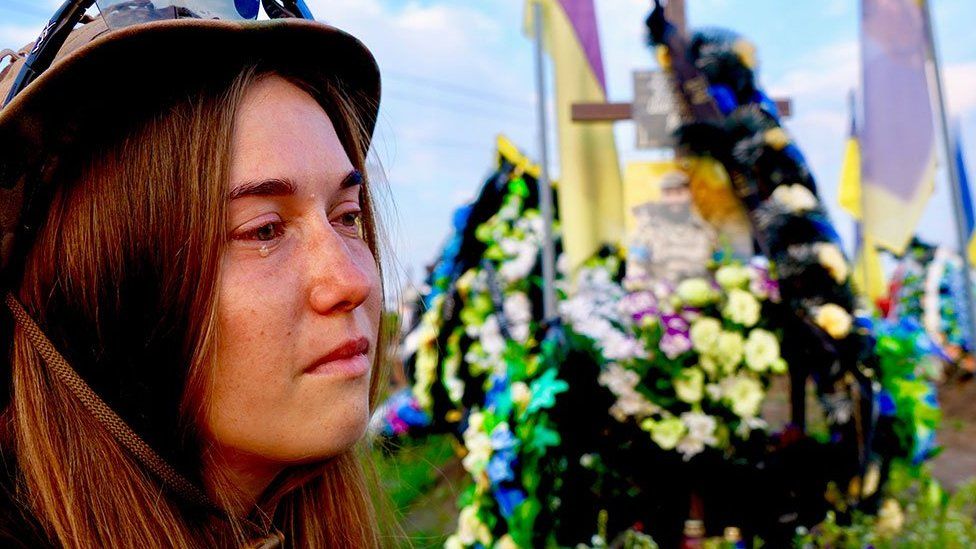
"He voluntarily went to defend our country," Oksana says. "He was a warrior at heart - freedom loving. He was the embodiment of our Ukrainian spirit."
It took time to identify Pavlo's body - he, along with others in the car, was badly burnt. Eventually he was recognised by a tattoo.
The yellow and blue of Ukrainian flags whip above each grave in the gentle breeze - there are hundreds of them. Each is a marker in the great tide of loss that sweeps daily across eastern and southern battlefields, filling cemeteries in towns and villages the length and breadth of Ukraine.
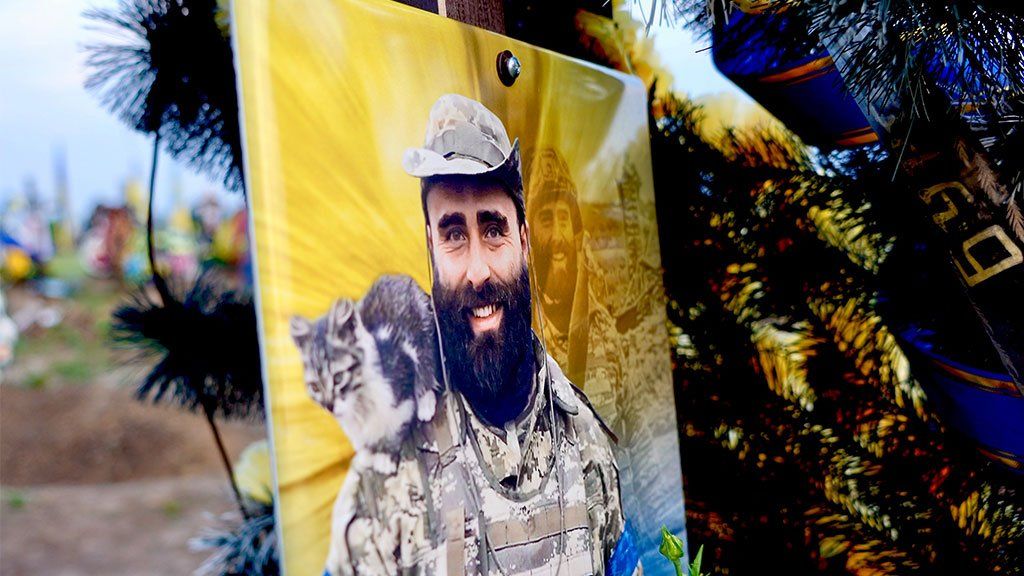
A year and a half into this war, few families here have been left untouched by grief.
But still, there appears to be no slackening in the will to fight. If anything, the losses have, for now, galvanised the determination for victory.
Oksana and Pavlo made a wartime pact that if he died, she would join the military. For the past two months she's been serving as part of an aerial surveillance drone unit, on the outskirts of Bakhmut.
A week after we met in the cemetery, Oksana is in full body armour and heading to a forward position in search of a Russian anti-tank unit which is targeting Ukrainian forces. When we get there, the sound of artillery, almost entirely outgoing fire, is deafening.
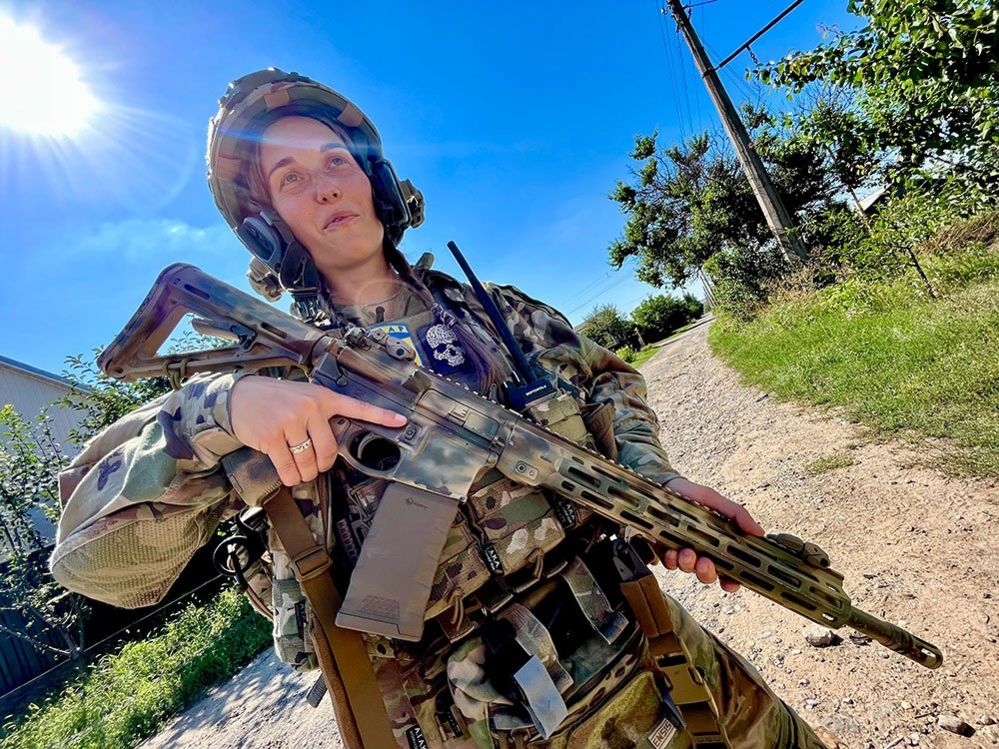
I ask her why she put herself in harm's way? It is her moral duty, she says, as she plays with the silver wedding ring on her right hand.
She says: "I just need to continue what he started. So, all his efforts were not in vain. Volunteering and donations are all good, but I want to be a part of it, a part of our victory in the future."

Ukrainian Deputy Defence Minister Hanna Maliar earlier released a statement warning that those who release casualty numbers would be liable to criminal prosecution.
"Why is this data secret?" she asked rhetorically. "Because during the active phase of the war, the enemy uses the number of dead and wounded to calculate our likely further actions… If the enemy has this information, they will begin to understand some of our next steps."
The toll of the war hangs heavy on the men of the 68th Jaeger Brigade, who are fighting to stop Russian advances on the eastern front, near the town of Kupiansk.
In 35C-plus temperatures, we sought some shelter under camouflage netting, away from the midday heat and the ever-present danger of Russian drones. A deputy battalion commander who goes by the call-sign "Lermontov" was in a reflective and dark mood. Over freshly brewed coffee, he predicted a long war.
The Russians won't stop, he said, "you can't negotiate with them". The West doesn't understand this. Young soldiers who expected to be home in a year realise now, he said, they will be gone longer.
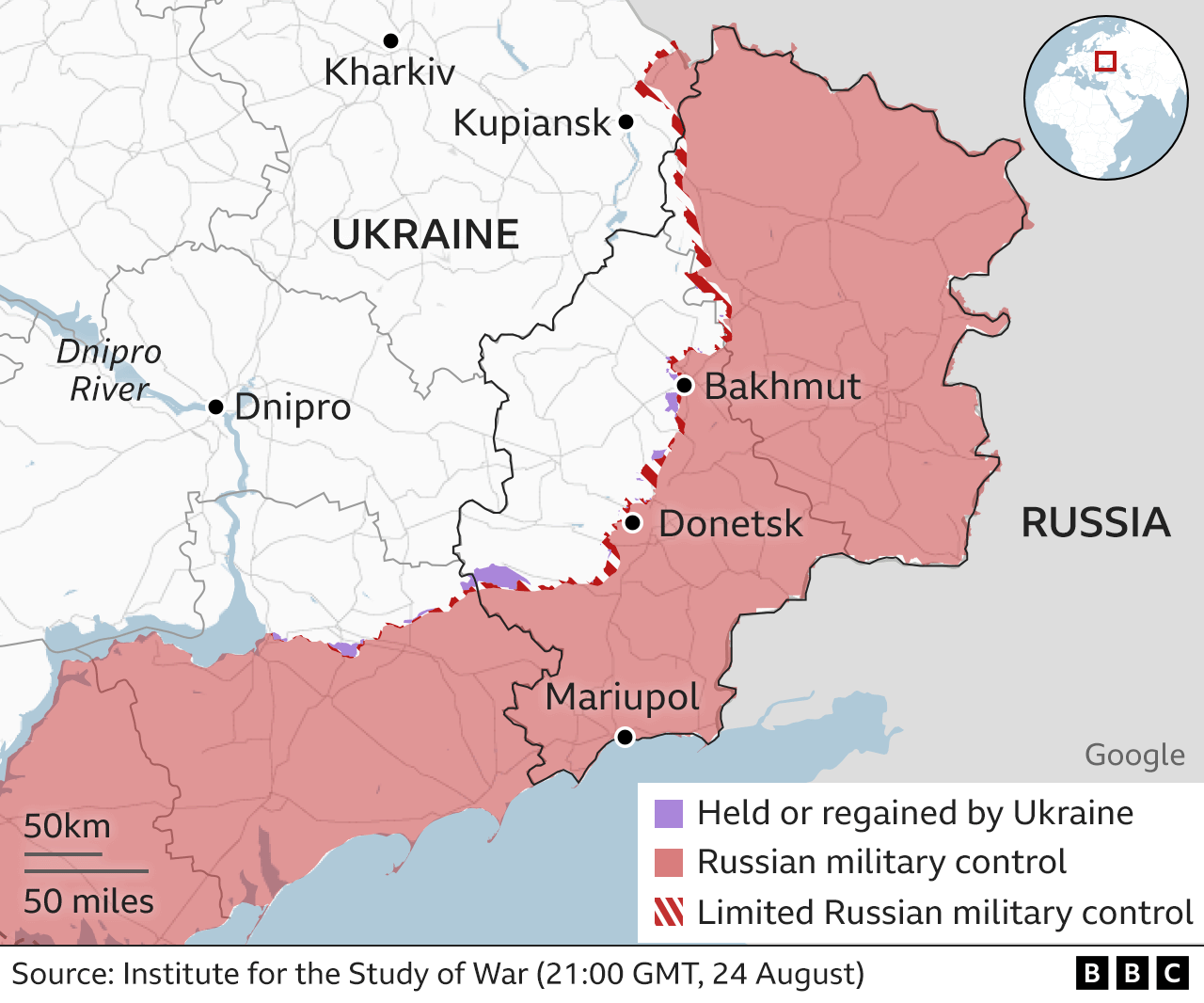
He is a veteran of the fight in Donbas, he's been fighting Russia and its proxies since 2014. How long then did he expect this war to last? "Another 10 years," he replied.
His grim mood was understandable. On 1 August, the brigade's sergeant major and two other sergeants were killed in a single Russian mortar strike. "He was a legend," Lermontov said. The dead man's car was parked where he had left it, a few feet away. His personal belongings still inside.
As we spoke, Lermontov's phone buzzed. It was the mother of a soldier killed the week before. She wanted to know why young men with guns were being sent to attack Russian trenches if Ukraine had been gifted so much modern Western weaponry. But on this 600-mile front line many brigades lack the latest armoured vehicles or long-range guns. The reality is that in many of the trenches, Ukrainian soldiers have to make do. "I don't have an answer for her, she doesn't understand… we don't have everything," he told me.
At a medal ceremony, in the garden of a house which serves as a company base, I meet the brigade's commander, Colonel Oleksii. He had just returned from the sergeant major's funeral.
He told me: "We had two big [Russian attacks]. I think we were very successful, we found around 35 bodies. So I think basically we demolished one company."
Overall Russia's casualties are far greater, some 120,000 dead according to the latest US estimate. But its army, and population, is far larger. Ukrainian soldiers at the front line say Russia's ability to absorb pain appears limitless.
I ask Colonel Oleksii what he tells the families of the fallen.
"I just ask for forgiveness that I have not provided enough safety. Maybe I was a bad leader, bad planning. And I thank them for what they gave for this fight."
Latest Stories
-
Paris 2024: Opening ceremony showcases grandiose celebration of French culture and diversity
4 hours -
Spectacular photos from the Paris 2024 opening ceremony
4 hours -
How decline of Indian vultures led to 500,000 human deaths
4 hours -
Paris 2024: Ghana rocks ‘fabulous fugu’ at olympics opening ceremony
5 hours -
Trust Hospital faces financial strain with rising debt levels – Auditor-General’s report
5 hours -
Electrochem lease: Allocate portions of land to Songor people – Resident demand
5 hours -
82 widows receive financial aid from Chayil Foundation
6 hours -
The silent struggles: Female journalists grapple with Ghana’s high cost of living
6 hours -
BoG yet to make any payment to Service Ghana Auto Group
6 hours -
‘Crushed Young’: The Multimedia Group, JL Properties surprise accident victim’s family with fully-furnished apartment
6 hours -
Asante Kotoko needs structure that would outlive any administration – Opoku Nti
7 hours -
JoyNews exposé on Customs officials demanding bribes airs on July 29
7 hours -
JoyNews Impact Maker Awardee ships first consignment of honey from Kwahu Afram Plains
8 hours -
Joint committee under fire over report on salt mining lease granted Electrochem
8 hours -
Life Lounge with Edem Knight-Tay: Don’t be beaten the third time
9 hours

